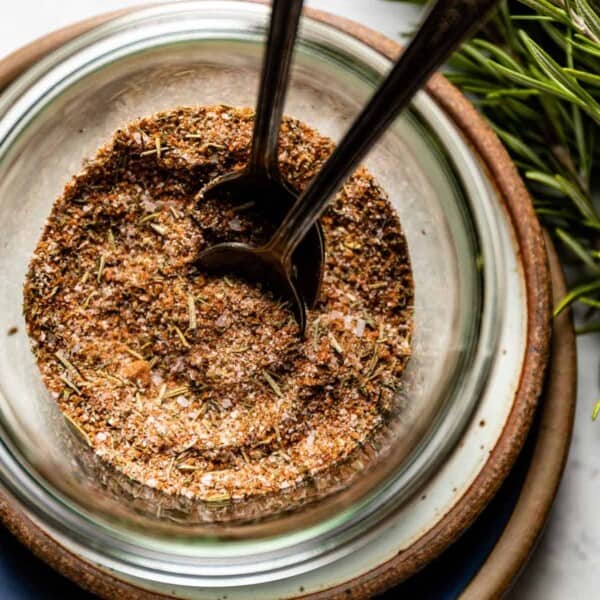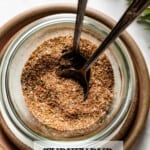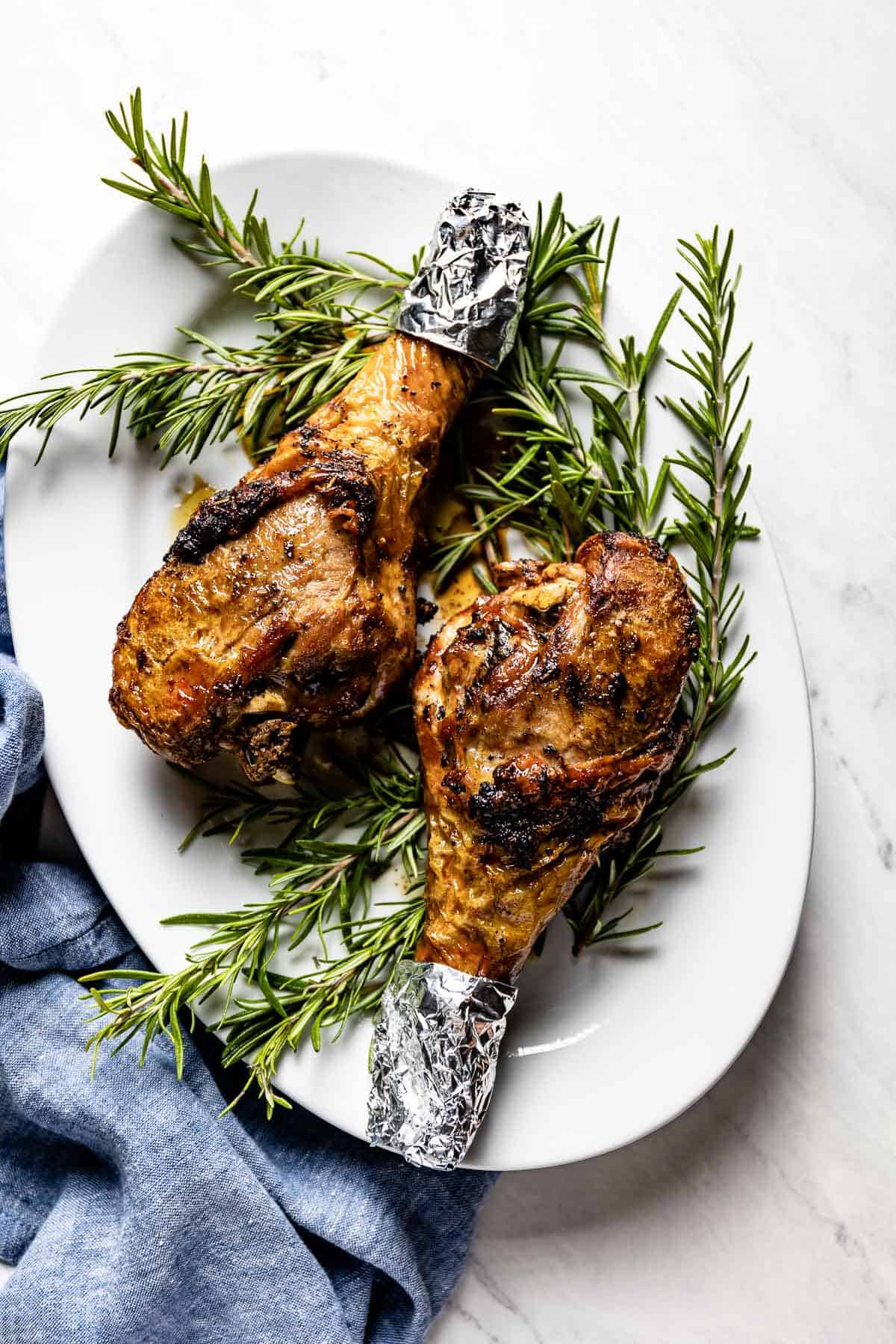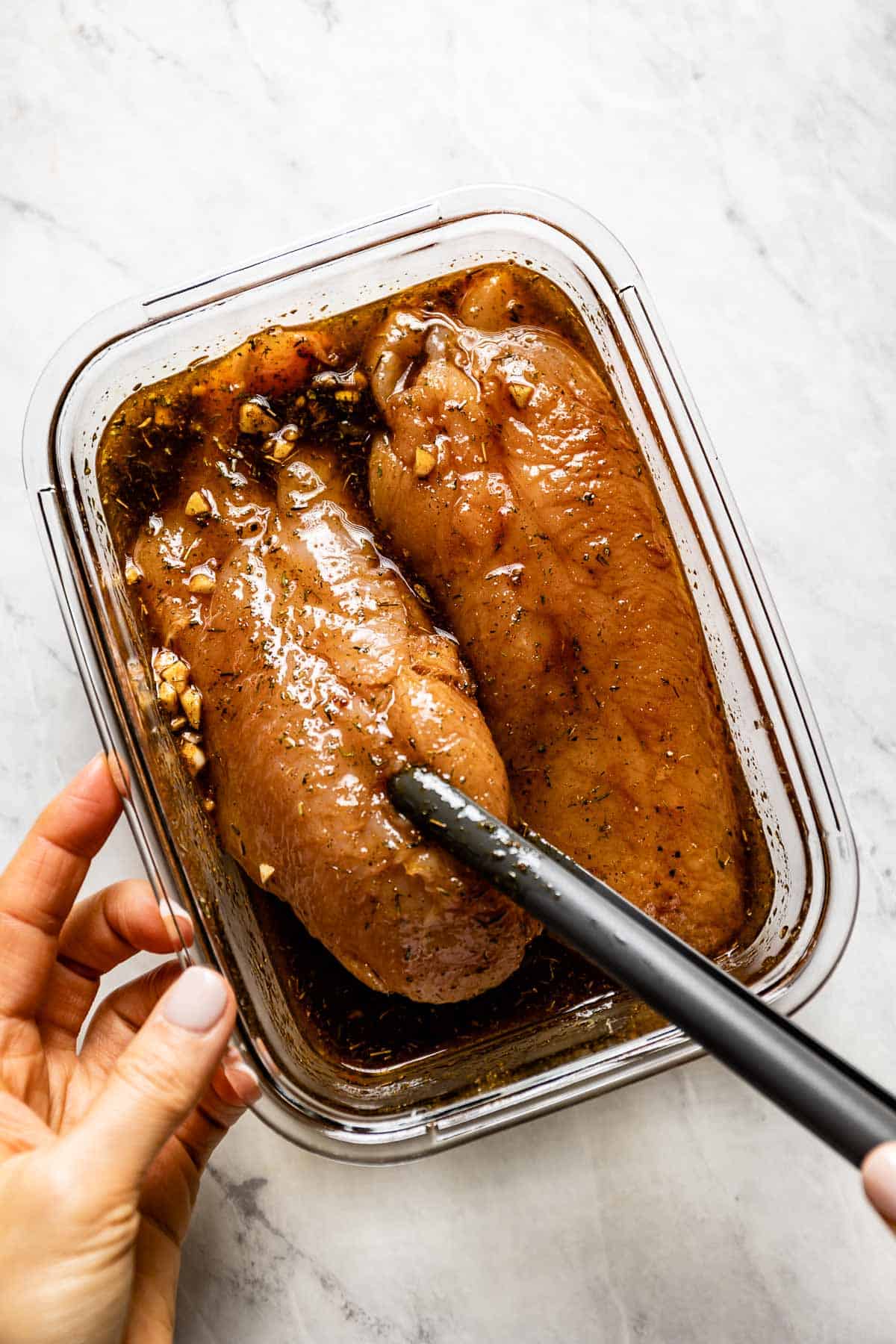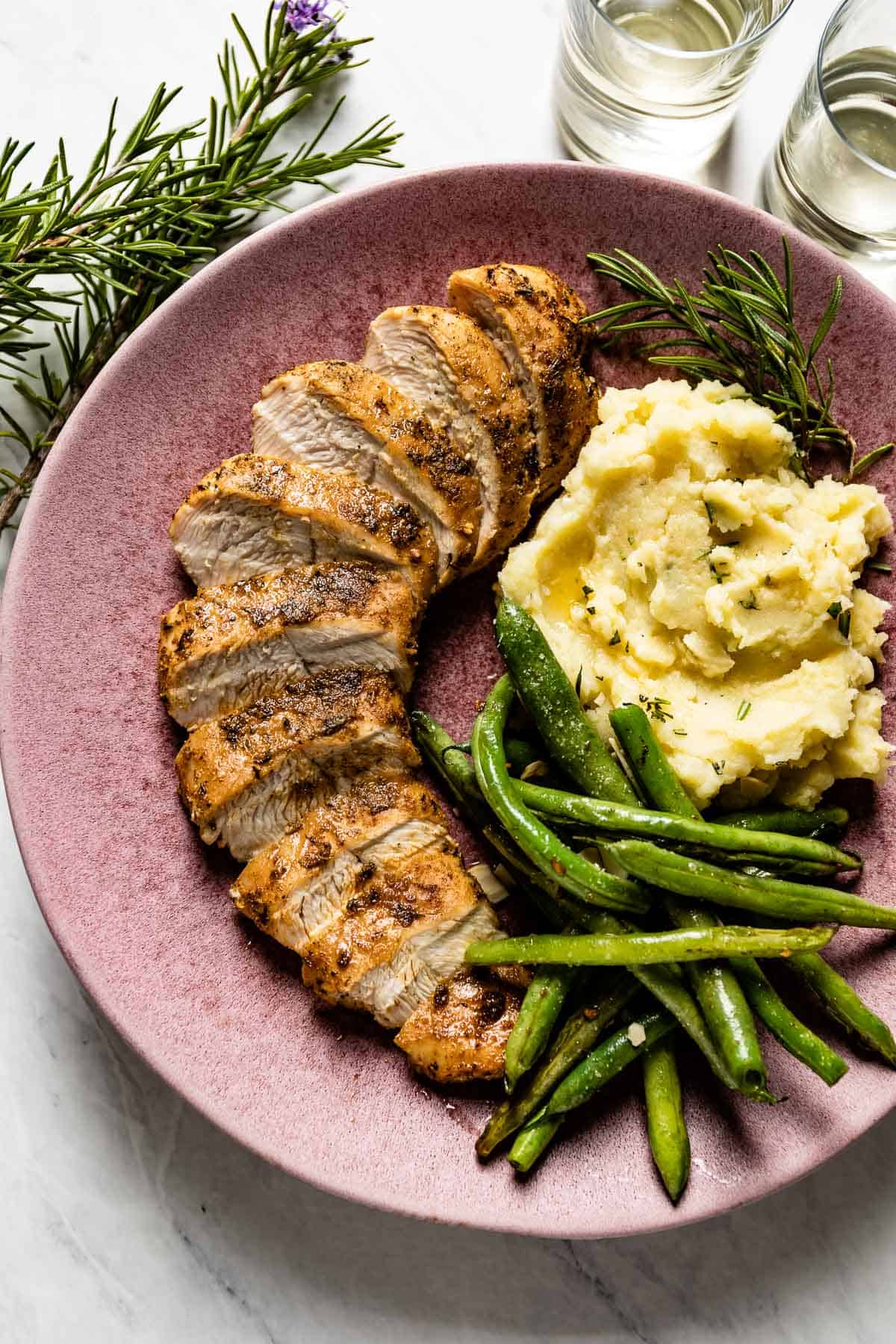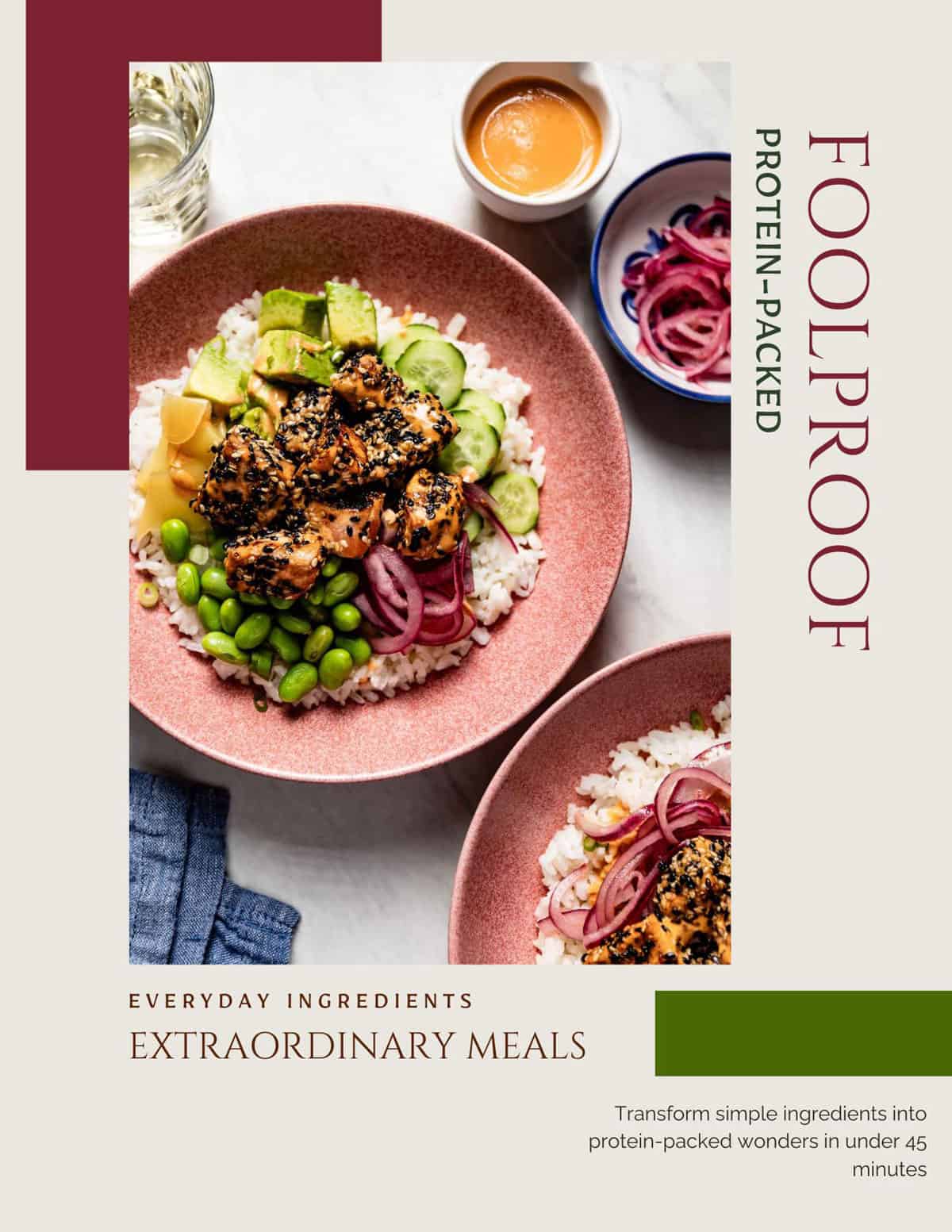Speaking of turkey, we have several turkey recipes here on the blog that you can serve for holiday gatherings or even everyday weeknight dinners. If you don’t want to cook a whole turkey, use this seasoning blend to flavor Baked Turkey Tenderloin, Roasted Turkey Legs, Turkey Breasts, or Air Fryer Turkey Drumsticks.
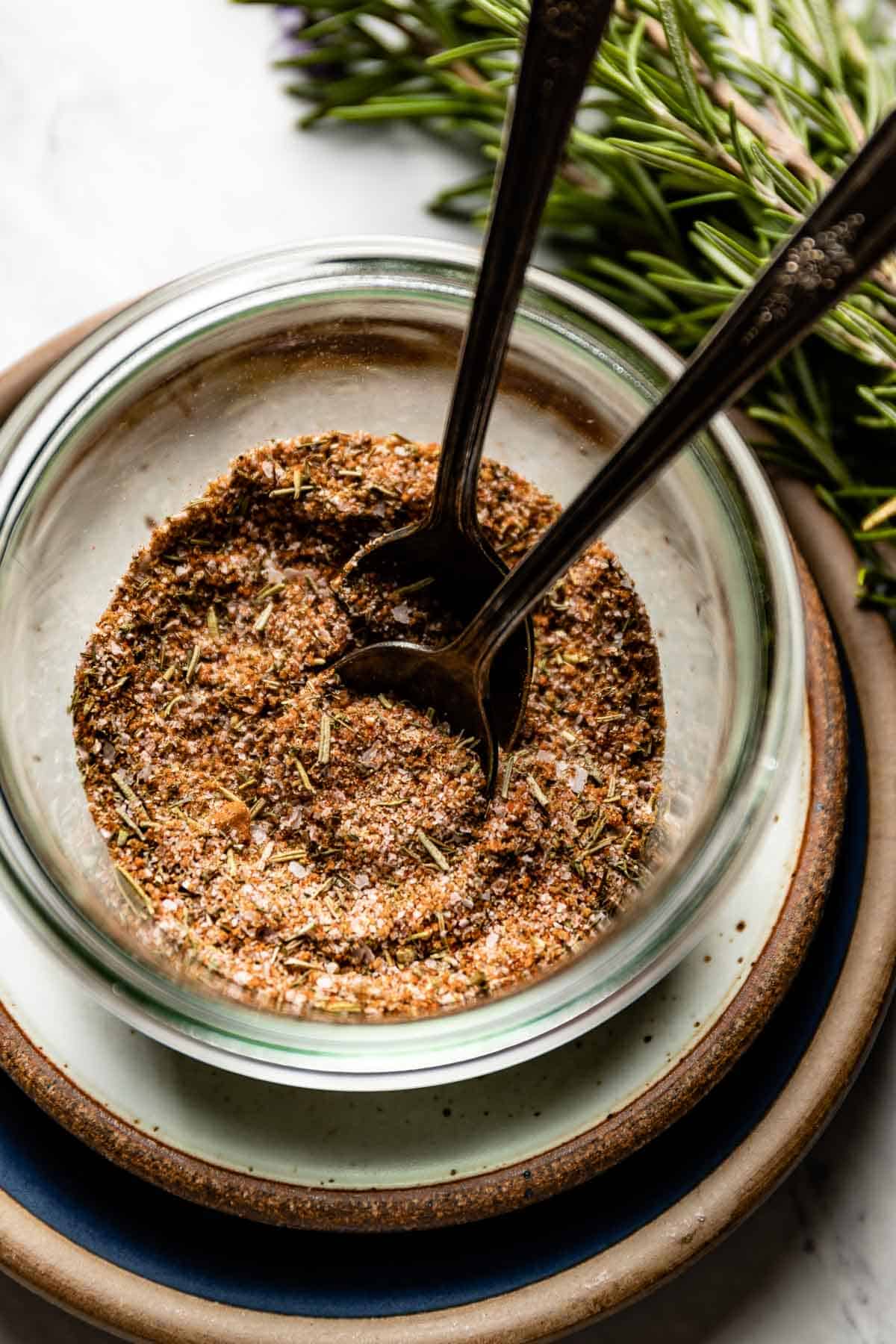
Any one of these turkey recipes pairs beautifully with my Sweet Potato Casserole and Maple Cranberry Sauce for a crowd-favorite holiday meal that’s sure to impress.
Ingredients
We’re using classic, recognizable spices and herbs for this easy turkey seasoning, so you likely already have all the ingredients in your spice cupboard. This turkey seasoning rub recipe makes enough for 10-12 pounds of turkey, but feel free to adjust or multiply based on your quantity of turkey.
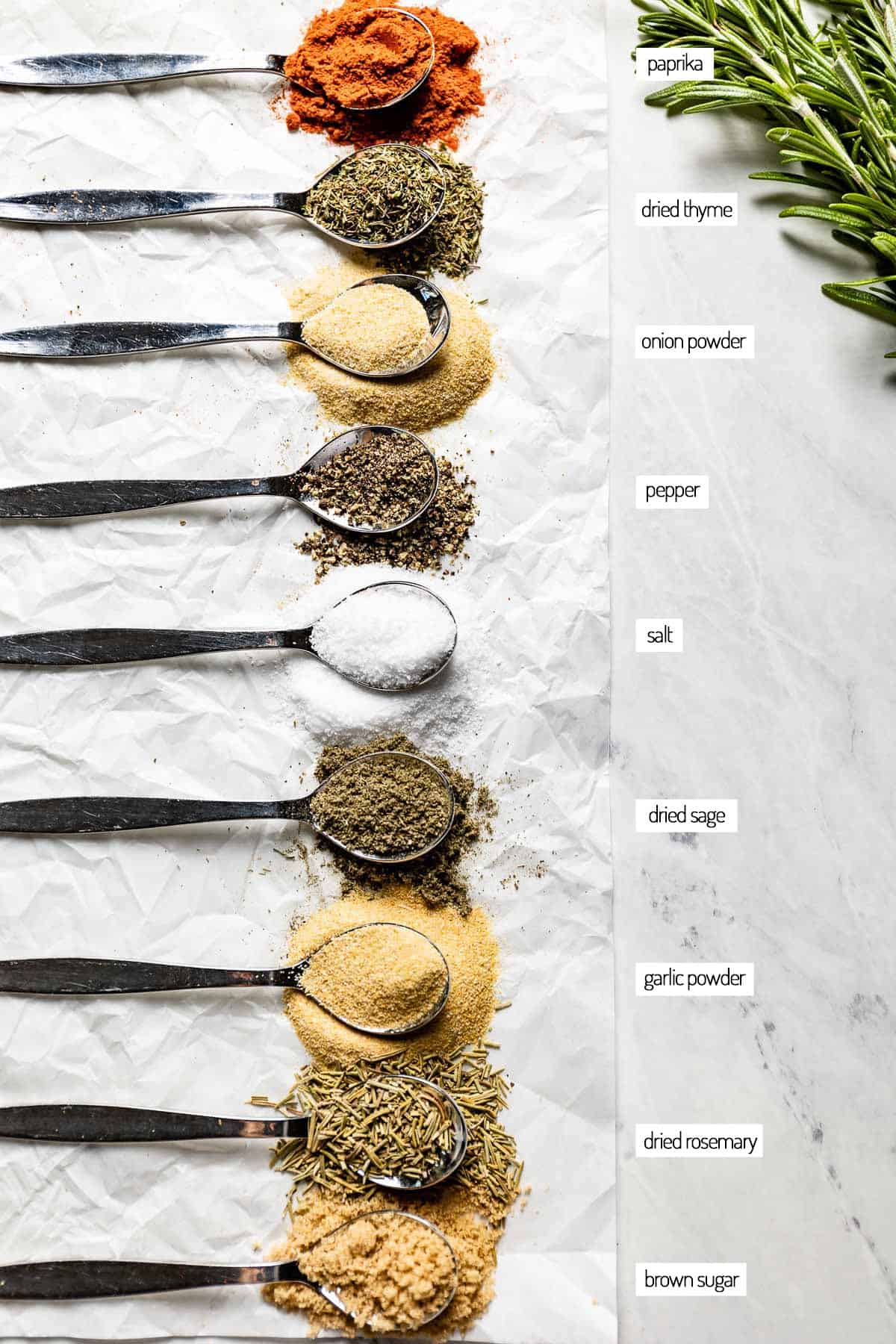
To make the turkey dry rub recipe, gather light brown sugar (or coconut sugar for a refined-sugar free option), paprika (or smoked paprika), dried thyme, dried sage (or oregano), dried rosemary, garlic powder, onion powder, kosher salt, and black pepper.
Substitutions
The beauty of this turkey spice blend is that it’s super easy to customize and very forgiving when it comes to substitutions. So, don’t sweat if you don’t have all the ingredients or if you’d like to make some swaps based on personal preference. Here are some suggestions:
- Sugar: I made a brown sugar turkey rub, but you can also substitute coconut sugar for a refined-sugar free rub recipe for turkey. Coconut sugar is similar to brown sugar in taste and appearance, leaving you with a very similar flavor profile. You can also completely omit the sugar for a sugar-free option.
- Paprika: You can use either sweet or smoked paprika for this simple turkey rub, but smoked paprika would add extra smoky flavor if you’re using this rub for smoked turkey. If you don’t have paprika on hand, you can substitute chili powder for a little kick of spice.
- Salt: I generally use (and recommend) Diamond kosher salt (affiliate link) when seasoning the turkey for roasting because it has larger, coarser grains than table salt, making it easier to spread evenly over your food and preventing over-salting. If you must use table salt, use half the amount that the recipe calls for to ensure you don’t over-salt your spice blend.
- Fresh herbs: If you’re making this turkey rub seasoning recipe for a Thanksgiving dinner or holiday meal and have leftover fresh herbs from other recipes, you can put them to good use in this blend of savory spices. When substituting fresh thyme, rosemary, sage, or oregano, make sure to give the herbs a good chop and use double the amount that the recipe calls for.
- Other spices to add: If you and your family are spice fanatics, kick this homemade spice rub up a notch by adding a ¼ teaspoon of cayenne pepper or red pepper flakes for some great flavor. You can also add about a half teaspoon of crushed bay leaves for a festive flavor for holiday turkey.
- Last minute additions: If you juiced a lemon or an orange for one of your holiday recipes, don’t throw it away just yet. You can use the peel to add lemon zest or orange zest to your seasoned roasted turkey, which will add brightness and a subtle tangy flavor.
How to Make Turkey Seasoning Rub
This dry rub for turkey couldn’t be easier to throw together. Simply add the light brown sugar, paprika, dried thyme, dried sage, dried rosemary, garlic powder, onion powder, salt, and pepper to a small bowl. Mix it all together, and you’re done!
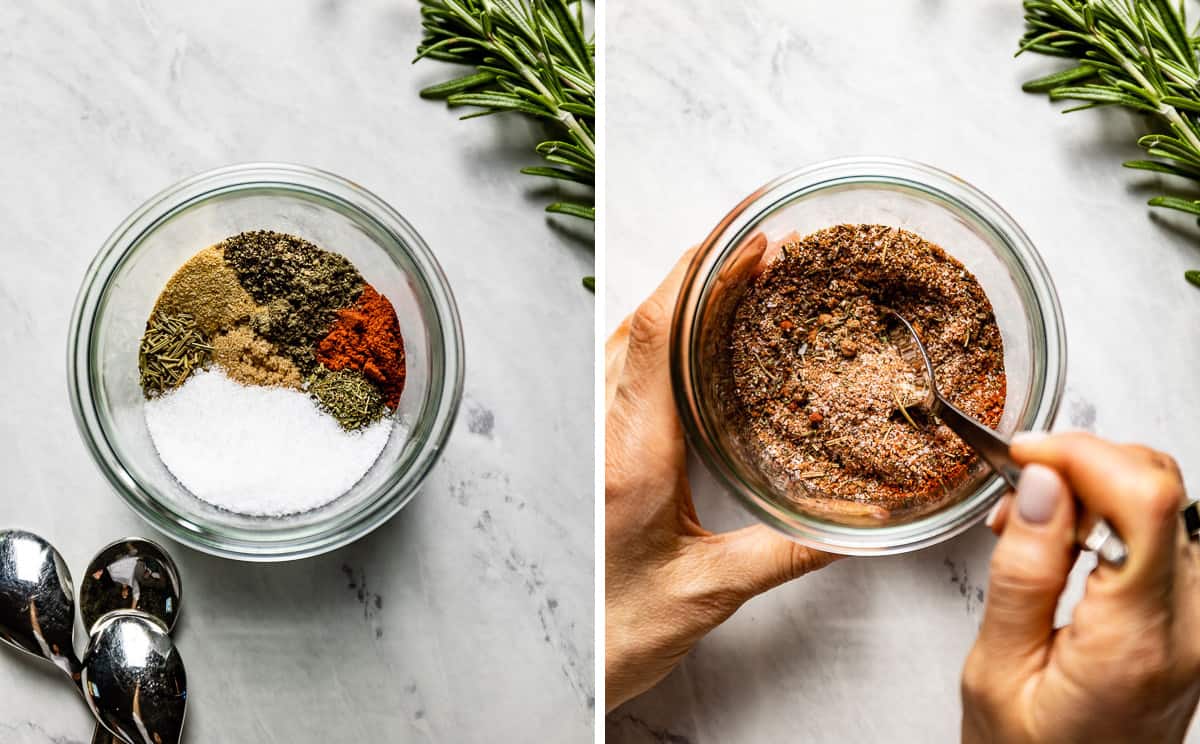
How to Season a Turkey Before Roasting
If you’re using this turkey spice rub for your Thanksgiving bird, you’ll want to season it a minimum of 12 hours and a maximum of 24 hours before cooking (I’ve found that 12 hours is the best way to go).
Also, if you purchased a frozen turkey from the grocery store, make sure to thaw it before applying the homemade turkey rub. Follow the steps below for an easy way to achieve a perfectly seasoned turkey that’s ready for the oven:
- Pat dry: Use paper towels to pat dry the turkey on all sides.
- Apply the dry rub: Don’t be shy when applying the simple turkey seasoning. Try to cover the whole bird with the seasoning mixture, paying attention to all the turkey parts, and don’t forget to apply some seasoning under the skin of the turkey. Seasoning a turkey for roasting using this method will give it lots of flavor! To rub the spice mix under the skin, carefully separate the skin from the meat and use your hands to apply the roasted turkey seasoning.
- Place turkey in the fridge: Place the seasoned turkey in a shallow roasting pan and store it in the fridge, uncovered, for 12 hours. It may sound a little scary to store raw turkey meat uncovered in your fridge, but according to this article on how to dry brine, doing so allows the skin to dry out and results in golden-brown, crispy skin. If you’re worried about leaving the turkey uncovered in your fridge, you can cover it loosely with foil or plastic wrap. Just make sure to pat the skin dry before roasting to help it crisp up in the oven.
Optional Wet Rub
If you’re roasting your turkey in the oven, you also have the option of turning this dry rub for a turkey into a wet rub by mixing it with butter or olive oil. The addition of fat helps the skin crisp up nicely and gives the turkey that beautiful, golden-brown appearance.
As an added bonus, the pan juices, extra seasoning, and butter or olive oil left at the bottom of the pan create an incredibly flavorful gravy that you can pour over the turkey once it’s roasted.
If you choose to make a wet rub, add a half cup of softened butter to your homemade turkey seasoning rub, mix, and apply to the outside of the turkey.
Storage Instructions
Since this seasoning for turkey is so versatile, I recommend making a big batch to store for future recipes. Simply store your turkey rub seasoning in an airtight container or spice jar for up to 3 months.
FAQs
Classic holiday herbs like sage, rosemary, and thyme make for a good turkey rub for baking, but combining these herbs with other spices for turkey creates a balanced rub that makes for an extra flavorful turkey. My turkey herbs and spices recipe combines light brown sugar, paprika, dried thyme, sage, rosemary, garlic and onion powder, and salt and pepper for a traditional turkey seasoning.
I recommend seasoning your turkey 12 hours before you plan to cook it. You can season the turkey the night before, but make sure not to season it any more than 24 hours in advance.
Whether or not to use oil in your dry turkey rub recipe comes down to personal preference. I don’t recommend adding oil to a rub if you’re planning on deep frying, as you’ll be adding too much liquid. If you’re roasting, you can rub the turkey with oil or butter and add your turkey seasoning recipe. When rubbing a turkey with butter, it helps to use softened butter, so it applies easily.
For a well seasoned turkey, gently separate the skin from the meat (being careful not to tear the skin) and use your hand to carefully apply the spice rub under the skin.
If you try this homemade Turkey Rub Recipe or any other recipe on Foolproof Living, please take a minute to rate the recipe and leave a comment below. It helps others who are thinking of making the recipe. And if you took some pictures, be sure to share them on Instagram using #foolproofeats so I can share them on my stories.
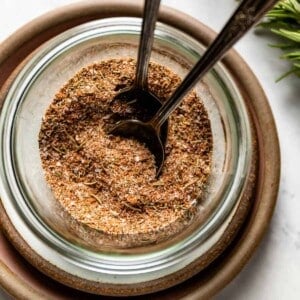
Turkey Rub Recipe
Ingredients
- 1 tablespoon light brown sugar, or coconut sugar
- 1 tablespoon paprika, or smoked paprika
- 2 teaspoons dried thyme
- 2 teaspoons dried ground sage or oregano
- 1 teaspoon dried rosemary
- 2 teaspoons garlic powder
- 1 teaspoon onion powder
- 2 tablespoons kosher salt* or 1 tablespoon table salt
- 1 teaspoon black pepper
Instructions
- Mix everything in a bowl and store it in an airtight container for up to three months.
Notes
- Servings: This recipe makes approximately ⅓ cup turkey seasoning, which will be enough for a 10-12 pound turkey.
- Salt: This recipe uses Diamond Kosher salt, which is less salty than Morton Kosher Salt and table salt. If you don’t have Diamond Kosher salt, you can use half the amount of Morton Kosher Salt or table salt.
- Storage: For long-term storage, place it in an airtight container and keep it in your pantry. It should be good for up to 3 months.
- To Season Turkey for Baking:
- Pat dry: Use paper towels to pat dry the turkey on all sides.
- Apply the dry rub: Try to cover the whole bird with the seasoning mixture, paying attention to all the turkey parts, and don’t forget to apply some seasoning under the skin of the turkey.
- Place turkey in the fridge: Place the seasoned turkey in a shallow roasting pan and store it in the fridge, uncovered, for 12 hours. Letting it fully dry will result in super crispy skin. However, if you’re worried about leaving the turkey uncovered in your fridge, you can cover it loosely with foil or plastic wrap. Just make sure to pat the skin dry before roasting to help it crisp up in the oven.
Nutrition
Nutrition information is automatically calculated, so should only be used as an approximation.
